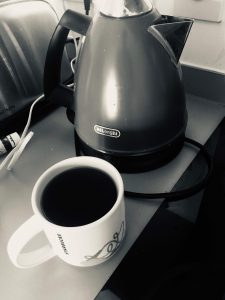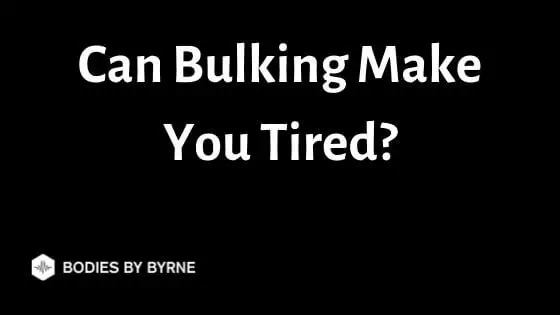Can bulking make you tired? Bulking can make you tired, sleepy or drowsy for a number of reasons, the key one being that the energy required by the body to digest a large meal is significant and blood is therefore drawn to the stomach from other areas of your body.
The purpose of a bulk is to consume a calorie surplus each day in order to facilitate muscle growth, the principle is that simple however the process will of course be different for everyone depending on your goals, body composition and other individual factors.
The number one issue that most people have when bulking is consuming enough calories every day, not everyone is blessed with a big appetite and most therefore struggle to get their required calories everyday.
Increasing appetite is something that can easily be fixed however, is this is something that you personally struggle with then you can check out some quick guides here & here
Appetite aside, the next biggest thing that people struggle with when bulking is surprisingly getting tired as the day progresses.
Why Do You Get Tired on a Bulk
The easiest way that you can relate to feeling tired after a heavy meal is to think back to a festive meal (Christmas dinner or Thanksgiving), after one of these meals you are instantly ready for a nap. This doesn’t just apply to people trying to eat big on a bulk, it’s usually the entire family.
This isn’t just a happy coincidence and something caused as a result of a festive meal, there’s actually some scientific reasoning behind why you feel tired after consuming a large meal and this factors into the question of can bulking make you tired?
The reason you feel tired after a large meal is primarily due to the energy requirements of the digestive process. The larger the meal and the more food sitting in your stomach as a result will cause triggers by the body to break down and digest this food as a priority.
What this means is that blood will be shuttled from other areas of your body to the stomach in order to facilitate the digestive process.
That’s understandable for one large meal, on a bulk however you are consuming multiple large meals throughout the day (if you are deep into your bulk and calories are genuinely high) so this then becomes a repeating process throughout the day which becomes difficult to manage.
Strategies to Combat Tiredness on a Bulk
Feeling tired on a bulk is something that you will need to come to terms with to an extent, the deeper into a bulk you go and more you raise the calorie surplus then it will be an inevitable side effect that most will need to come to terms with.
Bodybuilding, or building a physique in general is an extreme endeavor and therefore you will need to work around and find strategies to deal with unusual circumstances that and average gym goes would not even consider.
Thankfully when these circumstances come around there are of course ways to combat them and still move forward with your physique development.
Eat Smaller Meals More Frequently
This one may seem counter-intuitive, when you need to consume a high number of calories on a daily basis it makes sense to consume as much as you can each meal in order to ensure you hit your calorie targets.
This however isn’t the case and consuming smaller meals at more regular intervals (every 2 – 3 hours) will really have a drastic impact on your digestion whilst also allowing you to maintain a high calorie intake.
The reason this isn’t widely applied on a bulk is because of the notion of “eat big to get big” etc.. which gives the mentality of consuming as much as you can at every sitting. I’m not saying this isn’t an effective method however to reduce the feeling of tiredness, smaller meals are the way to go.
The reason this is so effective is because less food in your stomach at any one time is easier to break down and digest whilst also requiring less energy. As with most things in life an extreme approach to one thing will have an equally extreme counter reaction.
In the case of bulking, an extreme approach to dieting and consuming high quantity meals will require an extreme approach by the body to break this food down and utilise/absorb the calories. By reducing the size of your meals and eating more frequently you will reduce the extreme measures that your body needs to take for digestion.
This will feel easier and as though you are not doing enough however as long as you are getting your daily calorie target then this is the key focus of the bulk and not how much you can consume in each sitting.
Consume Caffeine

This is a bit of a debatable strategy to use if you are feeling tired from a bulk, caffeine is a thermogenic and an appetite suppressant meaning it raises body temperature and in turn burns more energy/calories and reduces your appetite, both of which are not ideal when bulking!
This is a strategy that you therefore need to weigh up and consider if the benefit of the energy boost is worth the downside (note the downside is specifically relevant to a bulk, caffeine on a cut is an amazing tool to utilise to burn calories and fight hunger pangs).
Is It Healthy to Drink Coffee After a Meal
Before you look to consume coffee immediately after a meal for a quick ‘pick me up’ you need to be aware of the effects coffee consumption can have on nutrient absorption.
Immediate coffee consumption after a meal will dampen the absorption of key nutrients for the body including Calcium, Iron and Zinc (Zinc in particular is essential for testosterone production which in turn feeds into muscle growth).
The purpose of a bulk is to consume an optimal nutrient ratio both in terms of macronutrients and micronutrients, therefore if you want to combat the feeling of tiredness on a bulk you need to make sure it’s not at the expense of any crucial functions.
If you want to utilise caffeine and consume coffee during a bulk then make sure it’s at least 1 – 2 hours after a meal to allow significant time for digestion and nutrient absorption.
Take Naps
Rest and recovery is one of the most important aspects of a successful bulk (alongside training and nutrition) if not arguably the most important. Your ability to recover from a workout is arguably more important than the workout itself.
One of the keys to muscle growth is stimulation of the muscle followed by the recovery period however this is often the area that most people neglect, mostly due to a hard training session psychologically feels as though you are forcing a change.
A focus on recovery should however be a focus and if you are feeling tired on a bulk then one of the most effective strategies that you can employ is to simply take naps and let your body handle the digestion and recovery aspect.
Does Napping Improve Muscle Recovery?
During sleep your body releases testosterone and growth hormone which are essential components of muscle growth and recovery, this comes from the form of deep sleep however (the time it takes to get into deep sleep will vary for everyone) so taking naps is not necessarily to shortcut to muscle recovery.
What a nap will do however is allow your body to focus on the important task of properly digesting your meals which in turn will improve nutrient absorption and therefore muscle recovery to a degree.
You will of course digest the food regardless of whether or not you take a nap but taking a nap after your largest meal of the day for example will only benefit your recovery.
*There is also research to show a greater release of growth hormone during an afternoon nap.
Improve Digestion
One final technique to combat tiredness during a bulk is to improve digestion. The body has a pretty good system in place when it comes to food digestion and nutrient absorption, evolution pretty much took care of that, however that’s not to say we can’t actively look to aid this process.
Anything you can do to support the digestive process and make it easier for the body will go a long way towards removing tiredness from a bulk and ultimately improving your recovery and physique in the process.
Eat Fibre Rich Food
One simple way you can aid the digestive process is by eating foods high in fibre. Now before hammering down a load of leafy green vegetables and bran flakes it’s important to know that fibre in itself is difficult for the body to breakdown and digest and it is also a filling food source, this isn’t ideal on a bulk.
Therefore you need to consume these food sources at the correct time and not in a huge quantity.
Your first strategy is to consume it at the end of your meal when you’ve already had the majority of your calories/macronutrients. By consuming it last it won’t matter if it’s filling or satiating as you won’t be consuming anything after it anyway (at least not for a few hours until your last meal is digested).
Next you want to track your fibre intake as you would with any other macronutrient and make adjustments based on how your body is responding. Start by slowly monitoring and increasing your fibre intake.
The best way to do this is to have two identical meals each day however for one meal you will want to increase the fibre content, my suggestion would be through a vegetable such as broccoli so that you don’t impact your overall macro intake.
Then all you need to do is compare the effects, how long your feed takes to digest, whether you feel any discomfort etc.. By doing this internal study you will be able to help get your digestion working optimally during a bulk and this should reduce tiredness.
Supplementation
A final tool that you can use to aid digestion is supplementation. The key one would be in the form of a fibre supplementation as this won’t impact your appetite like a whole food alternative previously mentioned would.
The most common and possibly effective fibre supplementation is Psyllium Husk, the effects work in the same way as a high fibre food however as always supplementation should be your last resort. Your body already has everything it needs to support a bulk but if you really need that extra bit of help then a fibre supplement could do the trick.
What Next
If you are looking to make changes to your physique by either losing body fat, building muscle or looking to maintain a lean physique then sign up to my weekly newsletter below. Each week I send out actionable tips to help you lose that extra 1lb of fat or build that extra 0.5lb of muscle mass on a weekly basis.
If you sign up now you’ll also receive my 28 day body recomp program completely Free. This ebook will be sent straight to your inbox and will provide an intense 28 day program aimed at helping you lose up to 8lbs of body fat whilst also building 2lb-4lb of lean muscle mass in just 4 weeks.
Don’t worry if you’re not ready for an intense program just yet, my weekly newsletter will give smaller tips that when implemented daily, will stack up over time and see you transform your body with seemingly minimal effort!
